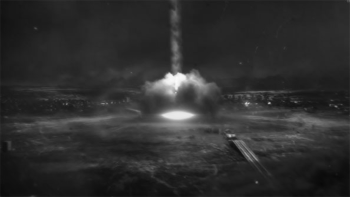Ardclach Orbital Strike
| Orbital strike on Ardclach | |||||||
|---|---|---|---|---|---|---|---|
| Part of War of Lost Brothers | |||||||
 Artistic rendering of the moment of impact |
|||||||
|
|||||||
| Belligerents | |||||||
| Units involved | |||||||
| |||||||
| Strength | |||||||
| 1 Damocles-class orbital bombardment platform | |||||||
| Casualties and losses | |||||||
The Ardclach Orbital Strike was an incident that occurred on 12.IV.1656 AN, during the War of Lost Brothers and which marked the second occasion in which weapons deployed from orbit, in this instance the NSS Damocles, had been used against a terrestrial target, in this instance ship-repair facilities, harbour and military installations established by the New Zimian War League in the settlement of Ardclach, located in the ungoverned regions of Northern Keltia.
Background
Authorisation for the strike had been given weeks previously but had been deferred to allow for improved meteorological conditions and target visibility. The rationale for the strike had its genesis in a deep seated desire to retaliate to the actions of the Stripping Path and their chemical attack in St.Andre. That the New Zimian War League was chosen for the target came as consequence of the assessment that Passio-Corum actively colluded in its planning and supplied the agent used. It was agreed by the Joint Military Commission of SANE that the target chosen would be of a military rather than an economic nature and that strategic weapons would not be employed against the territory of any sovereign nation, even those members of the USSO actively engaged in the conflict. This reduced the target list to enemy vessels at sea and to forces deployed into the Green, where non-combatant casualties would be most likely limited to stateless itinerants. Enemy vessels were excluded owing to concerns regarding the reliability of precision targeting with strategic weapons. This left forward deployed USSO forces and USSO aligned groupings and after those with allied forces in some proximity were excluded the Natopian-led Space Command came up with a shortlist of three targets:
- Llucmajor (Apollonia), an agricultural centre in the green (option: submarine launched ICBM)
- Jangsong (Keltia), a pirate haunt (option: orbital strike or atmospheric detonation of matter/anti-matter warhead)
- Ardclach (Keltia), an outpost of the Grand Army of the East with small garrison - converting cargo ship for amphibious operations (option: orbital strike or atmospheric detonation of matter/anti-matter warhead)
Llucmajor and Jangsong were ultimately rejected as being of too insignificant military value as to excuse any collateral civilian fatalities, even amongst indigents, pirates and renegade cultists. Delivery method was limited to an orbital strike as it was realised that the launch of inter-continental ballistic missiles could be misinterpreted as an attempted first strike. The detonation of matter/anti-matter warheads, of the variety found in the spacefleet's anti-ship torpedoes, was rejected as an option owing to concerns as to the impact of a sudden intense burst of gamma radiation on the local environment.
Attack
Munitions deployed consisted of four kinetic "kill vehicles", GPS guided tungsten rods, deployed from an altitude of 410 km by the Damocles, which had assumed a geosynchronous orbit, maintained artificially by the platform's gravimetric stabilisers, over the target site on the night previously.
The attack was first reported as an unidentified seismic and atmospheric event of an unknown nature and origin by the Caputian Geological Survey.
Aftermath
In the wake of the attack the Sxiro-Natopian allies moved their strategic forces to the highest state of alert under their respective national systems and moved both the Kaiser and the Emperor, along with certain designated continuity of government personnel, to secure undisclosed locations.
The Natopian Spacefleet also received authorisation to begin targeting USSO aligned orbital platforms including satellites and an unidentified radar and lidar contact in geosynchronous orbit over the Sea of Storms.
In terms of long-term impact, the Ardclach Orbital Strike served to accelerate the development and implementation of the Port of Vines and the International Bank of the East, which facilitated the establishment of closer political and economic ties between Passio-Corum and the Maritime Markets of the Strait of Haifa, and which helped to restore the economy of the Florian Republic following the War of Lost Brothers.
This article is WIP